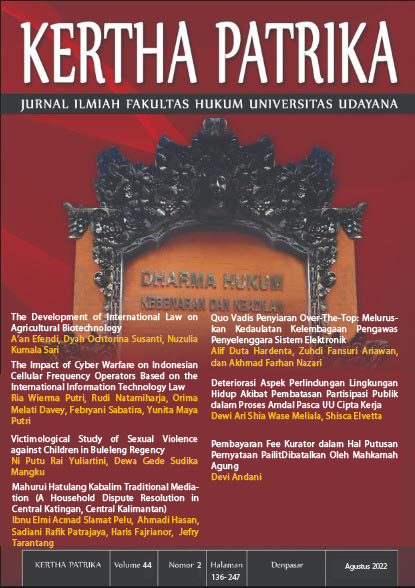The Development of International Law on Agricultural Biotechnology
Abstract
The agricultural biotechnology laws and regulations are sectoral and are spread out in various separate laws and regulations. This pattern has implications for overlapping content and difficulties in law enforcement. Another weakness is that agricultural biotechnology laws and rules do not comprehensively contain international legal principles that have been agreed globally to protect public health and the environment from the risks of using agricultural biotechnology. This study sets out three formulations of the problem: (1) why the renewal of legislation on agricultural biotechnology must be based on international law?; (2) what are the principles of international law as a source of renewal of legislation on agricultural biotechnology?; and (3) how is the implementation of international legal principles in agricultural biotechnology legislation? In this research using the type of normative legal research with a statute legal approach and a conceptual approach, three answers were obtained. First, international law is material for updating agricultural biotechnology legislation because of its strong influence on developing national law both now and in the future. Second, the principle of international law as a source of renewal of agricultural biotechnology legislation includes the principle of state sovereignty, the principle of prevention, the principle of prudence, the principle of polluters paying, the principle of cooperation, the principle of equal responsibility with different obligations, the principle of sustainable development, and the principle of participation public. Third, the implementation of the principles of international law is not carried out comprehensively but sporadically and is placed in the chapter on the principles, objectives, and scope of the law in question, not formulated in the form of a norm that has the legal force to be implemented.
Downloads
References
Faure, Maichel and Niessen, Nicole. (2006). Toward Effective Environmental Legislation in Indonesia?, dalam Michael Faure and Nicole Niessen (Eds), Environmental Law in Development Lesson from Indonesian Experience. Cheltenham, Edward Elgar.
Hartono, S. (1991). Politik Hukum Menuju Satu Sistem Hukum Nasiona. Bandung: Alumni.
Hartono, S. (2006). Bhineka Tunggal Ika Sebagai Asas Hukum bagi Pembangunan Hukum Nasional. Bandung: Citra Aditya Bakti.
Kamminga, M. T. (2003). Principles of International Environmental Law, dalam Glasbergen, Pieter and Blowers, Andrew (Eds), Environmental Policy in an International Context: Perspective on Environmental Problems. Oxford, Butterworth Heinemann.
Kiss, A. (2005). Course 1 Introduction To International Environmental Law. Geneva, The United Nations Institute for Training and Research Palais des Nations.
Kiss, A. and Shelton, D. (2007), Guide to International Environmental Law, Leiden/Boston: Martinus Nijhoff Publishers.
Kurukulasuriya, L. and Robinson, N.A. (Tanpa Tahun Terbit). Training Manual on International Environmental Law, Nairobi, United Nations Environment Programme.
Kusumaatmadja, M. (1999). Pengantar Hukum Internasional. Bandung: Putra Abardin.
Louka, E. (2006). International Environmental Law: Fairness, Effectiveness, and World Order. Cambridge, Cambridge University Press.
Mauna, B. (2011), Hukum Internasional: Pengertian, Peranan dan Fungsi dalam Era Dinamika Global. Bandung, Alumni.
Nussbaum, A. (1970), Sejarah Hukum Internasional, terjemahan Sam Suhaedi Admawiria, Bandung, Binatjipta.
Rahmadi, T. (2008). Penegakan Hukum Lingkungan di Indonesia: Hambatan dan Beberapa Saran Pembaharuan, dalam Departemen Hukum Tata Negara FH Universitas Airlangga, Dinamika Perkembangan Hukum Tata Negara dan Hukum Lingkungan. Edisi Khusus Kumpulan Tulisan dalam Rangka Purnabakti Prof. Dr. Siti Sundari Rangkuti, S.H. Surabaya, Airlangga University Press.
Sands, P. (2003),. Principles of International Environmental Law. Cambridge: Cambridge University Press, Second Edition.
Schmid, J.J. Von. (1988). Ahli-Ahli Pikir Besar tentang Negara dan Hukum (Dari Plato sampai Kant), terjemahan R. Wiratno et.al. Jakarta: Pembangunan.
Silalahi, D. (2006), The Implication of International Conventions for the Development of the Environmental Management Act, dalam Michael Faure and Nicole Niessen (Eds), Environmental Law in Development Lesson from Indonesian Experience. Cheltenham & Northamton, Edward Elgar.
Starke, J.G. (1989). Pengentar Hukum Internasional 1. Jakarta: Aksara Persada Indonesia, Edisi Kesembilan.
Wallace, Rebecca M.M (2002). International Law. London: Thomson Sweet & Maxwell, Fourth Edition.
Wilkinson, D. (2002). Environmental and Law: Routledge Introductions to Environment Series. London and New York: Routledge.
Journals:
Bruch, C. (2006). Is International Environmental Law Really "Law"?: An Analysis of Application in Domestic Court. Pace Environmental Law, 23(2), 3.
Koh, H.H. (1997). Why Do Nations Obey International Law?”, The Yale Law Journal, 106:2599, 2604-2605.











